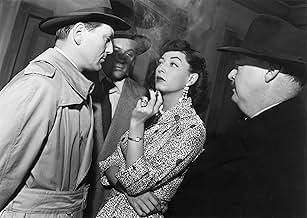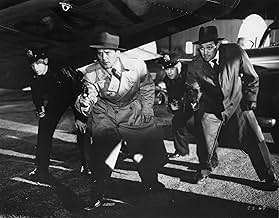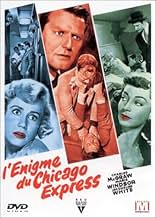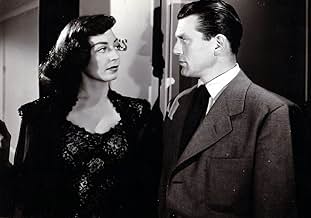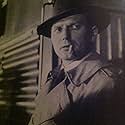IMDb RATING
7.6/10
9.4K
YOUR RATING
A woman planning to testify against the mob must be protected against potential assassins on the train trip from Chicago to Los Angeles.A woman planning to testify against the mob must be protected against potential assassins on the train trip from Chicago to Los Angeles.A woman planning to testify against the mob must be protected against potential assassins on the train trip from Chicago to Los Angeles.
- Directors
- Writers
- Stars
- Nominated for 1 Oscar
- 1 nomination total
Peter Brocco
- Vincent Yost
- (uncredited)
Ivan Browning
- Waiter
- (uncredited)
George Chandler
- Accomplice Running Newsstand
- (uncredited)
James Conaty
- Tenant in Apartment House Hallway
- (uncredited)
Don Dillaway
- Reporter
- (uncredited)
Franklyn Farnum
- Train Passenger
- (uncredited)
Bess Flowers
- Wagon Restaurant Diner
- (uncredited)
Don Haggerty
- Det. Wilson
- (uncredited)
- Directors
- Writers
- All cast & crew
- Production, box office & more at IMDbPro
Featured reviews
Trains have it all over ships and planes when it comes to creating a microcosm. On an airplane, everybody's crammed together; nobody can sneak on or leave (except by parachute or defenestration). An ocean liner has its private staterooms and public spaces, but, again, is an island, entire onto itself. But trains stop regularly to take on and disgorge passengers, and they run along their fixed and earthbound course, with windows looking out on rivers and highways, at big cities at high noon and small towns in the dead of night. And so they've always been the preferred vehicle for suspense, with countless thrillers using the rails as their setting. One of the tautest and most toothsome, in its modest, low-budget way, is Richard Fleischer's The Narrow Margin.
It opens in Chicago, where a pair of Los Angeles police detectives are to escort the widow (Marie Windsor) of a recently slain gang leader back to the coast to testify before a grand jury. She's a hard case (`a 60-cent special...poison under the gravy'), and guarding her is a dangerous job. Sure enough, one of the cops takes a fatal bullet in the stairway of her low-rent apartment house (she shows scant sympathy). Windsor's finally smuggled aboard the train, in a Pullman car's locked compartment adjoining that of her custodian Charles McGraw. Almost certainly, one or more mobsters followed her. It's up to McGraw to smoke them out before they kill Windsor, who knows too much. But he slowly learns that some vital information has been deliberately kept from him....
Fleischer makes inventive use of the jostling in the cramped passageways and of the all but vanished rituals of club cars and dining cars. He packs the train with seasoned character actors, notable among them Jacqueline White, Paul (`Nobody loves a fat man') Maxie, and Don Beddoe. The closely worked script, by Earl Fenton (based on a novel by Martin Goldsmith, who also penned the original material for Detour), doesn't stint on gaudy patter for them to spout (it's a moveable feast of salty epigrams).
Best of all, The Narrow Margin offers the addictive Marie Windsor her meatiest role, showcasing her tough-gal talents. Rolling her huge and extraordinary eyes, she aims her exhaled smoke like a stream of deadly gas and hard-boils her lines into hand grenades (to McGraw: `This train's headed straight for the cemetery. But there's another train coming along a gravy train. Let's get on it.'). It's one of Hollywood's more perplexing secrets why Windsor toiled exclusively, with the possible exception of her Sherry Peatty in Stanley Kubrick's The Killing, in the B-movie ghetto. But she helped make that ghetto the liveliest part of Tinsel Town.
It opens in Chicago, where a pair of Los Angeles police detectives are to escort the widow (Marie Windsor) of a recently slain gang leader back to the coast to testify before a grand jury. She's a hard case (`a 60-cent special...poison under the gravy'), and guarding her is a dangerous job. Sure enough, one of the cops takes a fatal bullet in the stairway of her low-rent apartment house (she shows scant sympathy). Windsor's finally smuggled aboard the train, in a Pullman car's locked compartment adjoining that of her custodian Charles McGraw. Almost certainly, one or more mobsters followed her. It's up to McGraw to smoke them out before they kill Windsor, who knows too much. But he slowly learns that some vital information has been deliberately kept from him....
Fleischer makes inventive use of the jostling in the cramped passageways and of the all but vanished rituals of club cars and dining cars. He packs the train with seasoned character actors, notable among them Jacqueline White, Paul (`Nobody loves a fat man') Maxie, and Don Beddoe. The closely worked script, by Earl Fenton (based on a novel by Martin Goldsmith, who also penned the original material for Detour), doesn't stint on gaudy patter for them to spout (it's a moveable feast of salty epigrams).
Best of all, The Narrow Margin offers the addictive Marie Windsor her meatiest role, showcasing her tough-gal talents. Rolling her huge and extraordinary eyes, she aims her exhaled smoke like a stream of deadly gas and hard-boils her lines into hand grenades (to McGraw: `This train's headed straight for the cemetery. But there's another train coming along a gravy train. Let's get on it.'). It's one of Hollywood's more perplexing secrets why Windsor toiled exclusively, with the possible exception of her Sherry Peatty in Stanley Kubrick's The Killing, in the B-movie ghetto. But she helped make that ghetto the liveliest part of Tinsel Town.
While director Richard Fleischer gets plenty of credit for his role in making the film noir classic "The Narrow Margin" on a shoestring budget, it is hard to imagine this picture without actor Charles McGraw in the lead role. As a tough cop escorting a witness to testify in Los Angeles, McGraw's performance is what holds the picture together. Try to think now of one actor around today who could portray a cop who is at times calculating, other times sarcastic and almost always menacing. In the Hollywood of the 1940s and 50s,Charles McGraw usually played secondary roles in A pictures. In "The Narrow Margin," McGraw shows that with a competent director, he could put on some performance as the star of a movie.
Detective Sergeant Walter Brown (Charles McGraw) and his longtime partner Detective Sergeant Gus Forbes (Don Beddoe) are assigned to travel to Chicago to bring the mobster's wife Mrs. Frankie Neal (Marie Windsor) to testify to the grand jury in Los Angeles against the mafia. They are ambushed at Mrs. Neal's building and Forbes is murdered by a mobster wearing a coat with fur.
Brown and Neal travel by train to LA and soon the detective realizes that there are hit men hired by the mafia to kill Mrs. Neal. However, the assassins do not know how she looks like, and Brown hides Neal in Forbes' room. Brown meets Ann Sinclair (Jacqueline White) in the restaurant, who is traveling with her annoying son Tommy and his nanny, and the mobsters believe that she is Mrs. Neal. Now Brown has to protect not only the unpleasant Mrs. Neal, but also Ann from the mobsters.
"The Narrow Margin" is a great film-noir with a tense story developed in an adequate pace and an unexpected plot point in the end. The direction is perfect and the cast has solid performances. The dialogs between Brown and Mrs. Neal are tough and her character does not worth a penny. I saw the excellent remake of this movie in the early 90's ("Margin Call") with Gene Hackman and Anne Archer, but unfortunately I had never seen the original movie. Today I have had the chance and I recommend it. My vote is eight.
Title (Brazil): "Rumo ao Inferno" ("Bound to Hell")
Brown and Neal travel by train to LA and soon the detective realizes that there are hit men hired by the mafia to kill Mrs. Neal. However, the assassins do not know how she looks like, and Brown hides Neal in Forbes' room. Brown meets Ann Sinclair (Jacqueline White) in the restaurant, who is traveling with her annoying son Tommy and his nanny, and the mobsters believe that she is Mrs. Neal. Now Brown has to protect not only the unpleasant Mrs. Neal, but also Ann from the mobsters.
"The Narrow Margin" is a great film-noir with a tense story developed in an adequate pace and an unexpected plot point in the end. The direction is perfect and the cast has solid performances. The dialogs between Brown and Mrs. Neal are tough and her character does not worth a penny. I saw the excellent remake of this movie in the early 90's ("Margin Call") with Gene Hackman and Anne Archer, but unfortunately I had never seen the original movie. Today I have had the chance and I recommend it. My vote is eight.
Title (Brazil): "Rumo ao Inferno" ("Bound to Hell")
Charles McGraw plays edgy cop Walter Brown. His job is to protect a dead racketeer's wife, Mrs Neil (Marie Windsor) from the mob. She's a key witness in a grand jury probe, and also has a payoff list linking gang members to the LAPD. Most of the film's action takes place on board the train taking Brown and Neil to Los Angeles, where she will testify.In Mrs. Neil, played to perfection by Windsor, the queen of B movies, the tough talking, wise-cracking Brown meets his match. On the way to meet her, he glibly tells his partner, Gus Forbes that "She's the sixty cent special. Cheap. Flashy. Sticky poison under the gravy." When he and Forbes, both from Los Angeles, first meet her, she says, "How nice. How Los Angeles." Then looking Brown up and down, she snarls, "Sunburn wear off on the way?" My favorite wisecrack occurs after Brown has finally had enough of her wise remarks and lashes out, "You make me sick to my stomach." Her retaliation is a gem: "Well, use your own sink." Unlike the banter between Nick and Noira Charles of The Thin Man series, there's nothing the least sophisticated about the way Brown and Neil talk each other. Director Richard Fleischer uses inventive camera work, the sounds of the train rather than a music score, and the train's claustrophobic atomsphere to create and sustain tension. An RKO picture, The Narrow Margin is an unpretentious, taut low-budget thriller, a minor classic far superior to the 1990 Gene Hackman-Anne Archer remake.
After finally waking herself up, a mobsters wife decides to testify against him and his organisation. As the trial draws closer she is constantly under threat of being murdered before she can spill the beans. Tough detective Walter Brown and his partner Gus Forbes are assigned to escort her safely across country via a train from Chicago to Los Angeles, but nobody can be trusted, and the threat of death is around everyone on board this speeding train.
Yes it may well be a "B" movie, but as "B" movies go this has to rank as one of the finest exponents of that particular arc. With the film taking place almost entirely on board the train, the tension sapping and claustrophobic feel is perfectly executed by director Richard Fleischer. The plot twists and turns and throws up genuine moments of surprise that thrill instead of hinder, whilst the ending doesn't cop out by pandering to the normal requisite of witness protection thrillers.
Charles McGraw is great as Brown, putting the hard into hard boiled and Jacqueline White is very precious as Ann Sinclair. Truth is, is that all the cast work well within the confines of this tightly produced picture. It was a surprise hit for RKO, where made on a small budget of under a quarter of a million dollars, it turned out to be a very profitable "B" production for the company. It wowed audiences back in the 50s and it's testament to the film's worth that today, here in the modern age, it's still being sought out and praised by movie lovers of all ages. 8/10
Yes it may well be a "B" movie, but as "B" movies go this has to rank as one of the finest exponents of that particular arc. With the film taking place almost entirely on board the train, the tension sapping and claustrophobic feel is perfectly executed by director Richard Fleischer. The plot twists and turns and throws up genuine moments of surprise that thrill instead of hinder, whilst the ending doesn't cop out by pandering to the normal requisite of witness protection thrillers.
Charles McGraw is great as Brown, putting the hard into hard boiled and Jacqueline White is very precious as Ann Sinclair. Truth is, is that all the cast work well within the confines of this tightly produced picture. It was a surprise hit for RKO, where made on a small budget of under a quarter of a million dollars, it turned out to be a very profitable "B" production for the company. It wowed audiences back in the 50s and it's testament to the film's worth that today, here in the modern age, it's still being sought out and praised by movie lovers of all ages. 8/10
Did you know
- TriviaIn preference to removing various walls from the sets, director Richard Fleischer decided to make extensive use of a handheld camera that could be brought into rooms; this was one of the first films to do so. To save money, the train sets were rigidly fixed to the floor and the camera was moved to simulate the train rocking.
- GoofsThere are palm trees at the Denver train station.
- Quotes
Walter Brown: Pardon me, I'd like to get through.
Jennings: Sorry, this train wasn't designed for my tonnage, heh. Nobody loves a fat man except his grocer and his tailor!
- Alternate versionsAlso available in a computer colorized version.
- ConnectionsFeatured in Hollywood the Golden Years: The RKO Story: Howard's Way (1987)
- How long is The Narrow Margin?Powered by Alexa
Details
Box office
- Budget
- $188,000 (estimated)
- Runtime1 hour 11 minutes
- Color
- Aspect ratio
- 1.37 : 1
Contribute to this page
Suggest an edit or add missing content

Top Gap
By what name was L'énigme du Chicago Express (1952) officially released in India in English?
Answer

